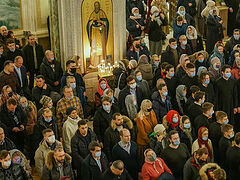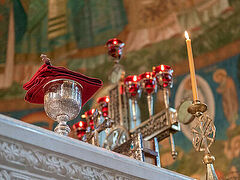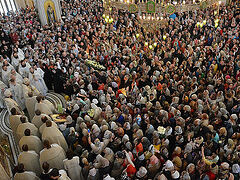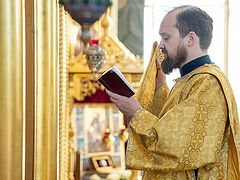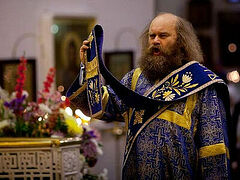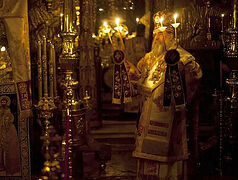Last time we considered the deacon’s petition for the holy church, and for those who enter therein with faith, reverence, and fear of God. And today we’ll consider the following petition:
“For our Archbishop (Name), for the venerable priesthood, the diaconate in Christ, for all the clergy and the people, let us pray to the Lord.”
Why is it so important, even necessary and obligatory to pray for the bishop at every Liturgy?
First of all, it’s important for reasons of the sacred canons. After all, the elevation of the name of the ruling hierarch testifies that true Sacraments are being celebrated in this church. We know that the first celebrant of the Divine Eucharist was our Lord Jesus Christ. In the Upper Room, during the Mystical Supper, He celebrated the first Eucharist and gave us the commandment: This do in remembrance of Me (Lk. 22:19). Since then, the most important remembrance of Christ for the Church has been the Divine Eucharist, whose participants partake of the mystery of salvation, of life eternal.
The Holy Apostles became the successors of Christ. At first, they were the celebrants of the Eucharist, which we read about in Acts (cf. Acts 2:42). The Apostles would gather the faithful, instruct them in the faith, and pray and celebrate the Sacrament of the Eucharist, with everyone communing of the Body and Blood of the Lord. The number of Christians grew steadily and the Apostles couldn’t physically be everywhere; therefore they consecrated bishops and ordained priests to celebrate the Eucharist. In the early years of the Church of Christ, only bishops celebrated the Eucharist and the priests were their assistants. Over time, the bishops gave their blessing for priests to celebrate the Sacrament. Even now, no priest has the right to celebrate the Eucharist or any other sacred rite without the blessing of the ruling bishop. As you can see, the direct Apostolic Succession of Orthodox bishops is one of the essential aspects of the true Church.
Back in the first century, Hieromartyr Ignatius the God-Bearer wrote: “Let that Eucharist be revered as true which is celebrated by a canonically consecrated bishops; that is, the successors of the Apostles” (cf. Epistle to the Smyrnaeans 8).
The Church realized rather quickly the need to proclaim the name of a canonically ordained bishop during the services, and this tradition has been preserved until today.
Thus, Apostolic Succession is of great importance. The Church has preserved it with great care, until today. How? By observing the canonicity of consecrations. Only a canonical bishop can ordain priests and deacons. And he himself receives his consecration from at least three bishops who, in turn, have a canonical succession going back to the Apostles. A canonically consecrated bishop holds the place of Christ in the Church; he’s an image of the Savior regardless of his character and behavior (he may be sinful, cursed, he might go to hell after death—that’s his personal affair). The bishop’s place is in the altar, behind the altar table. When he stands there, his face is turned towards the church; he as if oversees all Christians. That’s why he’s called a bishop, as an overseer of the entire Church.1
There have been many false bishops and false priests in every age. For example, here in Cyprus you can find people who wear a riassa and pretend to be priests although they have no ordination. They do this either because they’re in a state of spiritual delusion, or because they’re mentally ill, or because they’re just scammers. There are those who outwardly look like Orthodox priests, but in fact are schismatics. Who are the schismatics? They are people who have separated from the canonical Church on various issues of Church order, rite, or typikon. Schismatic priests aren’t canonical priests, and the Sacraments celebrated by them are invalid. There are also heretics—for example, Roman Catholics and Protestants—who have completely broken away from the Orthodox Church, who have created their own so-called churches, with their own hierarchy, bishops, and priests.
You’ve probably heard of the Unia and the Uniates. Metropolitan Christopher,2 the primate of the Orthodox Church of the Czech Lands and Slovakia came to our diocese not long ago. In his introductory speech, he said that Uniatism is a huge problem for the Czech Church. Why? Because in the Czech Republic and Slovakia, thousands of people go to churches that are architecturally no different than Orthodox churches; they see priests dressed in the same vestments as Orthodox clerics; they see that these priests celebrate the Liturgy exactly like Orthodox priests do, according to the same liturgical books. There’s only one difference between the Uniate and Orthodox services. What is it? Uniate priests commemorate the Pope of Rome in the services. This is the only difference, nothing else. The Orthodox Christians there, without realizing it, fall into the trap. The Catholics deceive the faithful, presenting as if it’s an Orthodox church, whereas in fact this church is Catholic—heterodox.
Here in Limassol, for example, there are Old Calendarist schismatics. One of them calls himself the bishop of our city. If you go to their Liturgy, you’ll see that it’s exactly like ours. But the Old Calendarists don’t commemorate a canonical bishop, but rather their own.
Our Old Calendarists declare: “We do everything right. And in the Jerusalem Church, and on the Holy Mountain, and in Russia they serve like us, on the old calendar.” With such statements they deceive the people. Their words are completely false. Why? Because if the Old Calendarists go to Jerusalem, no one there will commune them, and they can’t concelebrate with anyone. The Patriarch of Jerusalem doesn’t accept the Old Calendarists into communion. Similarly, not a single metropolitan or priest of the Jerusalem Church accepts them. At the same time, of course, the canonical Cypriot and Jerusalem Churches have Sacramental communion. When we celebrate the Liturgy, we commemorate Patriarch Theophilos of Jerusalem. And when he serves, he commemorates the primate of the Cypriot Church. Therefore, we’re one Church.
You can ask the Old Calendarists:
“Do you believe in the Holy Fire?”
“Of course.”
“Can the Holy Fire descend through the prayers of heretics?”
“No.”3
“Well, since the Fire doesn’t descend by the prayers of heretics, that means Patriarch Theophilos is Orthodox. And if he’s Orthodox, that means that all of us who are in communion with him and commemorate him, and whom he commemorates, are all members of the one Body of the Orthodox Church. That means, whoever isn’t in communion with Patriarch Theophilos, whoever doesn’t concelebrate with him and doesn’t commemorate him, and whomever he doesn’t commemorate, is outside the Orthodox Church.
After all, in order to be an Orthodox Christian, it’s not enough just to believe what the Church teaches. You have to be a member of the Church through Holy Baptism and participation in the other Sacraments, especially in the Sacrament of Holy Communion. You can believe in all the teachings of the Orthodox Church without deviating one iota, but nevertheless not be Orthodox. An example of this is the Old Calendarists. They believe in the same things we do, but having separated themselves from canonical bishops, and from the Church, they remain outside of it. They’re in schism.
There’s another reason why the name of the bishop is elevated during the Liturgy. What is it?
The bishop is the father of the Church, which entrusted this ministry to him. As a good shepherd, he goes ahead of his flock, and the faithful follow their bishop. They listen to him and do what he tells them. Several bishops form a Local Council, which, in turn, can convene a council of the entire Orthodox Church, and we, members of the Church, accept the resolutions of the Councils. We should pray for our bishops that the Lord might enlighten them to rightly divid[e] the word of truth (2 Tim. 2:15).
I tell you from my own experience: The episcopal ministry is a great cross, often completely unknown to the world. You can’t imagine how many difficulties you have to face every day! Scandals, temptations, sorrows, sufferings—those visible for all to see, and those hidden from others, which you can’t tell anyone about…
The Apostle Paul teaches Christians to obey the leaders among them, that is, the bishops and priests, and not erect stumbling blocks for them. From my own small experience, I’ll say that in the past thirteen years of my episcopal ministry, I’ve encountered the greatest difficulties from people who go to church, and not from those who never go. Sometimes Church people are worse than those who are outside the Church—they insist they’re right, they don’t want to listen and understand what you’re saying to them, they threaten and shout, and behave in a manner completely against the Gospel.
Of course, we suffer many afflictions from non-Church people too. They have abused us and spat upon us, and this continues to this day. Remember St. Luke of Crimea—you’ve all read his life. Books are still being published about the New Martyrs—bishops, priests, deacons, monks, nuns, laymen—who suffered for faith in Christ in countries where the regime used to be atheistic. Reading these books, you see what torments all of these people endured. And that this was not so long ago, someone might say—just twenty or twenty-five years ago—practically in our day. In Albania, one bishop was buried alive. And how many torments Hieromartyr Chrysostomos of Smyrna suffered!4 They gouged his eyes out, chopped off his hands, cut his tongue out, dragged him through the city streets, and tore him to pieces. And many other bishops suffered in a similar way. No one knows when this could happen again.
There are people who mortally hate bishops, priests, and other clerics. And not because they have something specific against them. Not at all. But only because in his person, the priest represents Christ and the Church.
Here’s something that happened to me while I was studying in Thessaloniki. One day I was going home from school. I was in my riassa. There was a woman walking behind me. She cursed and swore at me in every way possible. There were many people on the street, and she was following close behind me and just swearing, swearing, and swearing… I picked up my pace, but she also sped up, with no intention of falling behind. At first I didn’t understand who she was berating. Me? But how did she know me? Maybe she was talking to herself? I sharply turned down a small street, and she made the turn as well. I turned again, and she turned too. Lord have mercy! What was I to do? Passing by a bookstore display, I decided to stop. She also stopped next to me.
“I’m cursing you,” she told me. “Did you hear how I’m cursing you?”
“Yes.”
“Did you hear it all?”
“Yes, everything. Thank you.”
“Good!” the woman said with satisfaction, and she turned around and left.
She didn’t even know me. She just saw a cleric in a riassa, and it evoked hatred in her. I could tell you many more stories like that…
Let us sympathize with those who bear the cross of the priesthood. And how many difficulties married priests have to overcome! How many difficulties their children have to face! They might tease them in school: “Your papa’s a priest! Priest’s daughter! Priest’s son!” Newspapers can write all sorts of ridiculous articles with “colorful” headlines. For example, “Priest’s daughter beats up a neighbor!” when in fact these neighbors simply argued—how many neighbors argue every day? Or: “Priest’s dog bites a passerby!” “Priest’s cat…” “Priest’s mouse…” No matter what you do, you’ll be a target for all kinds of attacks.
However, facing similar difficulties from people outside the Church is one thing. You can find some consolation: People behave this way because they don’t know God. But when problems arise within the bosom of the Church and from Church people, this is much harder.
Every bishop strives for the good of the Church and the people around him. And, undoubtedly, every bishop carries out a great feat that we don’t know about. And if we don’t know about it, then let us not condemn anyone, but rather pray for those who have voluntarily taken on this feat, who have voluntarily dedicated themselves to the Church.
All of us, the rest of the members of the Church, want good spiritual fathers, good priests, good preachers. We haven’t chosen the cross of the priesthood for ourselves, or for our children, or for our grandchildren. We think: “Let someone else do it. But give us good priests and bishops!” But they don’t fall from Heaven, but are born in families, from parents. Of course, we can’t all do the same thing. We all have different aspirations and unequal opportunities; but let us pray for one another, and at least not put obstacles in the way of those who have taken up the episcopal cross. Let’s not be exacting about their mistakes.
Bishops are people too, and undoubtedly make many mistakes. I’ve already told you many times that I get annoyed when people consider me infallible, that I don’t make any errors or mistakes. Who am I? An alien? Of course I have my mistakes, sins, and passions. And the devil fights with me, as he does with all other people. It’s a huge delusion when someone declares: “I have no temptations; I make no mistakes; I don’t err.” Who makes the most mistakes? He who says he has no mistakes.
So, first, let us not create any obstacles and stumbling blocks for our clerics, and secondly, let us help them by our prayers. Let us pray for our bishops, priests, and deacons, for those who serve in the Church. They’re in great need of the prayers of their brethren. Therefore, Christ commands us to pray for those who labor in the harvest field. If you yourself can’t plow, can’t sow, can’t harvest the field, then at least don’t throw rocks into the field but rather pray for those five or ten “weirdos” who work in this field, and help them with your prayer. We could’ve gotten married and had families, we could’ve been wearing suits, driving cars, walking along the coast after dinner, or going to country houses for the weekend… But we have voluntarily dedicated ourselves to the Church for the love of Christ.
When there are temptations and scandals in the Church, when the bishop makes mistakes, when he undergoes temptations, difficulties, we, the faithful, should act as we do when problems arise in our own homes, in our families, with our children. After all, we don’t rejoice when these things happen; we don’t go out on the balcony and declare our difficulties. On the contrary, we try to conceal our family troubles, not to reveal the nakedness of those close to us, not degrade them. In the same way, with love and kindness, let us cover the shortcomings of clerics, let us heal them with our love and prayers.
We should act this way not only in regard to clerics, but in general with everyone: Let us not divulge the failures and sufferings of others; let us not gloat and rejoice. Let’s say you have a problem with a neighbor. When you gossip about them with other neighbors, the temptation only increases, and things get worse. Your neighbors are getting worse, and you yourself are getting worse. What’s the right thing to do in such a situation? Keep quiet and pray to Christ for your neighbor. But not like this: “Forgive them, my Christ, for causing me so much harm. I’m an innocent dove, a gentle lamb, but they’re tigers devouring me… But still, forgive them, my Christ.” That’s not the kind of prayer I mean, of course.
Prayer during the difficulties that befall us softens our temptations, enlightens us, acts as a balm, as an oil that softens our wounds. Meanwhile, condemnation, gloating, and gossip worsen the situation and make us instruments of satan: We condemn, and our loved ones suffer. And do you know what the scariest thing is? That we can often condemn even people who are holy or innocent. In the Gospel, Christ doesn’t allow us to condemn anyone. Therefore, let us treat everyone around us with love and good will, and especially those who have voluntarily taken up the cross of Christ, the cross of the episcopal or priestly ministry. Let us ever pray for them.


